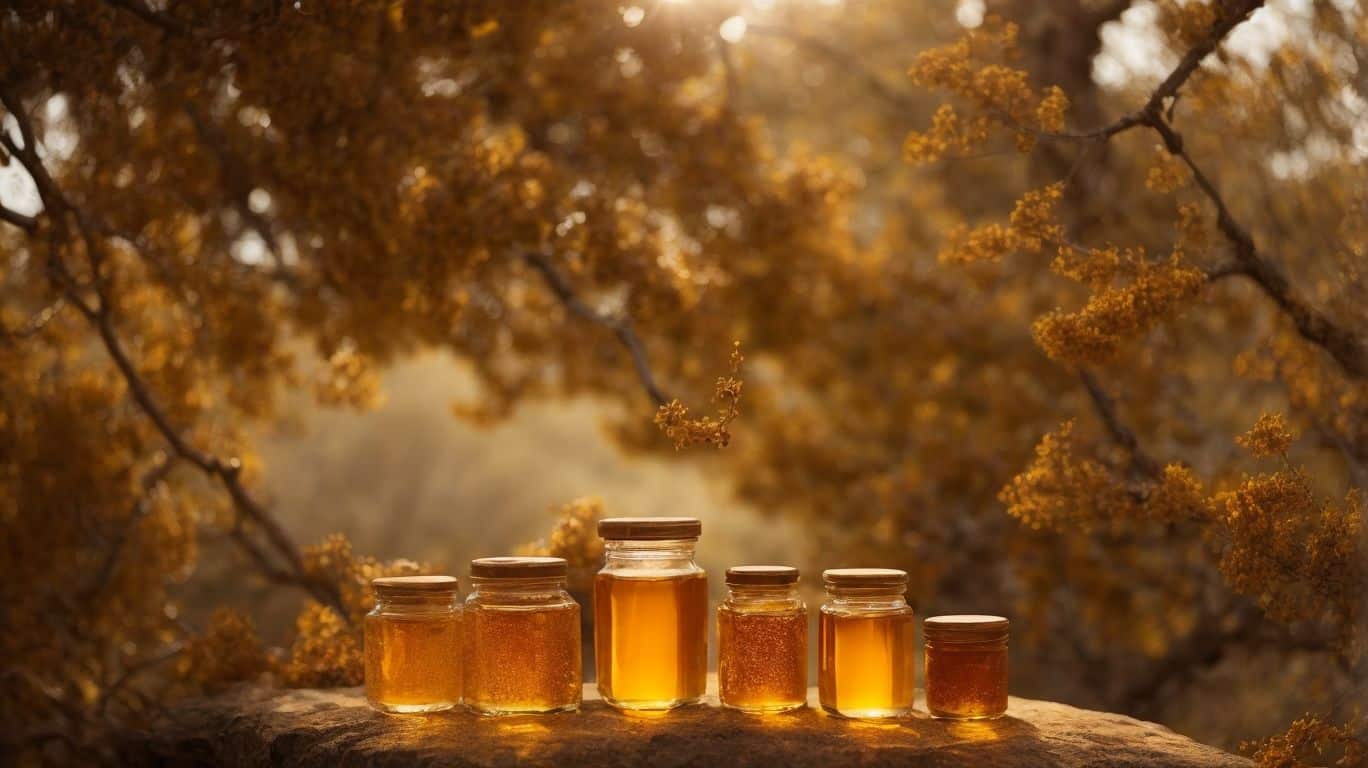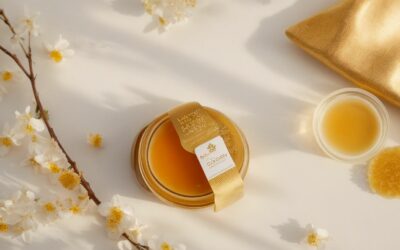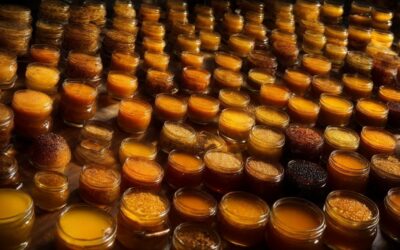Welcome to the world of honey, where natural remedies meet scientific research. Are you struggling with low testosterone and looking for a natural solution?
Look no further, as we delve into the science behind the potential benefits of Manuka honey for testosterone levels. Trust us, your body will thank you.
How Does Manuka Honey Affect Testosterone Levels?
Manuka honey has been touted for its numerous health benefits, including its potential to boost testosterone levels.
But how exactly does this sweet nectar affect our hormone levels?
In this section, we will dive into the science behind the relationship between manuka honey and testosterone.
We will discuss how manuka honey can increase testosterone production, reduce estrogen levels, and even improve sperm quality.
Get ready to discover the powerful effects of this natural remedy on our hormonal balance.
1. Increases Testosterone Production
According to PubMed, honey does increase serum testosterone levels in males.
Incorporating manuka honey into your diet can help boost testosterone production. Here are some simple steps to include manuka honey in your daily routine:
- Start your day with a tablespoon of manuka honey mixed into warm water or herbal tea.
- Use manuka honey as a natural sweetener in your coffee or smoothies.
- Incorporate manuka honey into your meals by drizzling it over roasted vegetables or using it as a glaze for grilled meats.
- Include manuka honey in your pre-workout or post-workout snacks for an energy boost.
- For a natural face mask, mix manuka honey with other ingredients like lemon juice or aloe vera gel and apply it to your skin. Leave it on for 15-20 minutes before rinsing off.
By following these steps, you can easily add manuka honey to your daily routine and enjoy the potential benefits of increased testosterone production.
2. Reduces Estrogen Levels
Reducing estrogen levels can have numerous health benefits for men. To incorporate Manuka honey into your diet and potentially achieve this, here are a few methods to try:
- Use Manuka honey as a natural sweetener in your meals and beverages.
- Add Manuka honey to your smoothies or tea for a boost of flavor and potential health benefits.
- Apply Manuka honey directly to your skin as a face mask, leaving it on for 15-20 minutes before rinsing off.
By following these steps, you can enjoy the potential estrogen-reducing effects of Manuka honey while also reaping its other health benefits.
3. Improves Sperm Quality
Manuka honey has been found to have positive effects on sperm quality, making it a beneficial addition to men’s diets for reproductive health. Here are steps to incorporate Manuka honey into your daily routine:
- As a natural sweetener: Use Manuka honey as a substitute for sugar in your beverages and food.
- In smoothies or tea: Add a spoonful of Manuka honey to your favorite smoothie or cup of tea for added sweetness and potential health benefits.
- As a face mask: Mix Manuka honey with other ingredients, such as yogurt or oats, to create a nourishing face mask that can improve the health of your skin.
True history: The indigenous Māori people of New Zealand have been using Manuka honey for centuries for its medicinal properties. Its unique antibacterial and healing properties have gained worldwide popularity.
Research has shown that Manuka honey can have a positive impact on sperm quality, making it a valuable addition to a healthy diet for men looking to improve their reproductive health.
What Are the Other Health Benefits of Manuka Honey for Men?
While many are familiar with the use of manuka honey as a natural remedy for low testosterone levels, this powerful superfood has numerous other health benefits for men.
In this section, we will dive into the various ways that manuka honey can support men’s health.
From boosting energy and stamina to improving digestive and heart health, we’ll explore the science behind the benefits of manuka honey beyond its effects on testosterone levels.
So let’s take a closer look at the other health benefits of incorporating manuka honey into your daily routine.
1. Boosts Energy and Stamina
To boost your energy and stamina, try incorporating Manuka honey into your diet with these easy steps:
- Use it as a natural sweetener in your beverages, such as coffee or tea.
- Add it to your smoothies for an extra burst of energy.
- Apply it topically as a face mask to nourish and revitalize your skin.
2. Improves Digestive Health
Incorporating Manuka honey into your diet can greatly benefit your digestive health. Here are three simple steps to do so:
- As a natural sweetener: Use Manuka honey instead of refined sugars in your recipes.
- Incorporated into smoothies or tea: Add a spoonful of Manuka honey to your favorite smoothie or cup of tea to reap its digestive health benefits.
- As a nourishing face mask: Mix Manuka honey with other natural ingredients to create a nourishing face mask that not only benefits your skin but also your digestive health.
3. Supports Heart Health
Incorporating manuka honey into your diet can have a positive impact on heart health in multiple ways:
- Antioxidant properties: Manuka honey contains antioxidants that can help reduce oxidative stress and inflammation in the cardiovascular system.
- Cholesterol management: Consumption of manuka honey has been shown to improve lipid profiles by lowering levels of LDL cholesterol.
- Regulates blood pressure: Manuka honey may aid in lowering blood pressure by promoting nitric oxide production, which helps relax blood vessels.
To incorporate manuka honey into your diet, try using it as a natural sweetener, adding it to smoothies or tea, or even using it as a face mask for its skincare benefits.
Consider adding manuka honey to your routine to naturally support heart health.
How To Incorporate Manuka Honey Into Your Diet?
Manuka honey is a natural superfood renowned for its numerous health benefits, including boosting testosterone levels in men.
But besides consuming it straight from the jar, there are other delicious and creative ways to incorporate it into your diet. In this section, we’ll discuss three easy ways to add manuka honey to your meals and drinks, as well as a bonus tip for using it in your skincare routine.
Get ready to elevate your taste buds and your health with the sweet and potent Manuka honey.
1. As a Sweetener
Using Manuka honey as a natural sweetener in your diet can add a unique and delicious flavor to your favorite foods and beverages. Here are some steps to incorporate Manuka honey as a sweetener:
- Add a teaspoon of Manuka honey to your morning coffee or tea for a healthier alternative to processed sugar.
- Drizzle Manuka honey over your breakfast cereal or yogurt for a natural and sweet start to your day.
- Use Manuka honey as a substitute for sugar in baking recipes, adjusting the amount as needed.
Pro-tip: For maximum health benefits, opt for a high-quality Manuka honey with a high UMF (Unique Manuka Factor) rating. This ensures that you are getting the authentic, medicinal properties of Manuka honey.
2. In Smoothies or Tea
To incorporate Manuka honey into your diet through smoothies or tea, follow these simple steps:
- Add a teaspoon or two of Manuka honey to your favorite smoothie recipe.
- Blend the ingredients together until smooth and well combined.
- Alternatively, you can also add a teaspoon of Manuka honey to a cup of hot or cold tea.
- Stir the honey into the tea until it dissolves completely.
- Enjoy your delicious and nutritious smoothie or tea infused with the goodness of Manuka honey.
I recently started adding Manuka honey to my daily green smoothie, and I noticed a significant improvement in my energy levels and overall well-being.
The subtle sweetness of the honey perfectly complemented the flavors of the fruits and vegetables in the smoothie, making it a delightful and healthy treat.
Give it a try and experience the benefits of Manuka honey for yourself!
3. As a Face Mask
Using Manuka honey as a face mask can provide numerous benefits for the skin. Here are the steps to incorporate it into your skincare routine:
- Cleanse your face with a gentle cleanser.
- Apply a thin layer of Manuka honey to your face, avoiding the eye area.
- Leave the mask on for 15-20 minutes to allow the honey to work its magic.
- Rinse off the honey with warm water and pat your face dry.
- Follow up with your favorite moisturizer to lock in hydration.
Using Manuka honey as a face mask can help hydrate the skin, reduce inflammation, and promote a healthy glow.
It is important to note that everyone’s skin is different, so it’s always a good idea to patch test before applying it to your entire face.
Enjoy the benefits of this natural ingredient for a radiant complexion.
Frequently Asked Questions
What is Manuka Honey and how does it relate to testosterone?
Manuka Honey is a type of honey that is produced by bees that pollinate the Manuka bush in New Zealand. It has been found to have numerous health benefits, including its potential to increase testosterone levels in the body.
How does Manuka Honey affect testosterone levels?
Studies have shown that Manuka Honey contains high levels of certain amino acids and vitamins that have been linked to the production of testosterone in the body. These nutrients can help to stimulate the hormone’s production and increase its levels.
Can Manuka Honey be used as a natural testosterone booster?
While Manuka Honey may have the potential to increase testosterone levels, it should not be used as a substitute for prescribed testosterone therapy. It can, however, be used as a natural supplement to support overall hormone balance and health.
Are there any other benefits of consuming Manuka Honey?
Aside from its potential to increase testosterone levels, Manuka Honey has been found to have antibacterial, anti-inflammatory, and antioxidant properties. It has also been shown to aid in wound healing and improve digestive health.
How should I incorporate Manuka Honey into my diet for its potential testosterone-boosting effects?
It is recommended to consume Manuka Honey in its raw, unprocessed form for maximum benefits. This can be done by incorporating it into your daily meals or consuming it as a supplement in the form of capsules or liquid extract.
Is there any scientific evidence to support the link between Manuka Honey and testosterone?
While more research is needed, several studies have shown a positive correlation between the consumption of Manuka Honey and an increase in testosterone levels. However, individual results may vary and more research is needed to determine the exact mechanisms behind this potential effect.
I’m a Manuka honey enthusiast and creator of Manuka Honey Organic, a blog where I share my journey with authentic Manuka honey from New Zealand. I want everyone to learn about the healing powers of Manuka honey.





